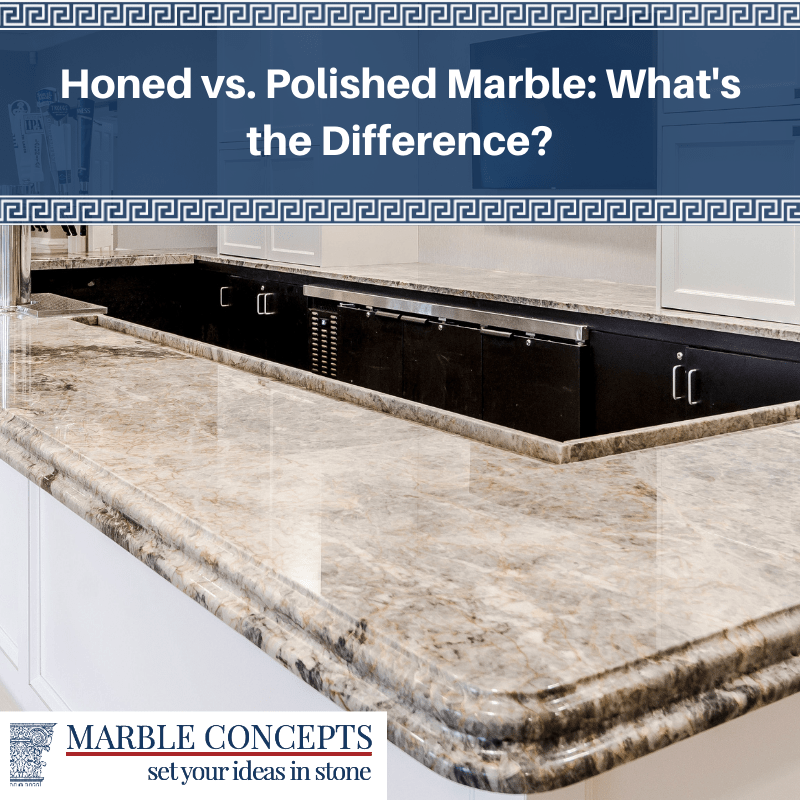If you’re not familiar with the differences in marble, it would probably not surprise you about the characteristics of honed and polished marble. There are definite distinctions in the finish, edges, touch and color with both. These features affect the looks of a natural stone like marble. So, what are the differences between honed and polished marble? Here is a rundown on those differences.
Honed Marble
Honed marble is a stone that has not been polished, which gives it a matte or flat finish as opposed to the distinctive shine of polished marble. With honed marble, the appearance of veins, coloring and depth are less prevalent. Depending on the honed stone you choose, any of its features may be diminished and change from a lighter to a denser appearance in its surface pattern and coloration.
Honed marble surfaces are natural in appearance and are a popular selection as a matte marble finish is not as prone to scratches. The surface of honed marble does not reflect light like polished marble does, so it’s not as affected by scratches. If and when scratches appear, they’re not as noticeable. One thing with honed marble, it’s prone to staining, so it’s important to clean up any spills right away. Another important factor with honed marble is that the matte surface makes it an excellent choice for flooring, as there is less chance of slippage.
What to Watch for with Honed Marble
Sealing – When it comes to stains, Honed marble does require proper sealing. A good seal will definitely hinder the possibility of staining.
Scratching – Honed marble is an appropriate choice in keeping scratches at bay. As stated previously, the surface is matte and scratches are much easier to hide than those of a polished surface. Plus, any reflection is easily diverted with a matte surface.
Etching – Honed marble will etch when spills are left on the surface for too long. Etching will show up as drab spots on your honed marble surface. You want to be cautious with any spills and wipe them up immediately.
Polished Marble
Polished marble has gone through a polishing process that acts as a shield to inhibit staining. The process gives the stone a shiny and reflective appearance. With polished marble, you get the full effect of the veining and coloring of the stone; however, a reflective surface does present problems with visible scratches, which makes polished marble a limited choice for flooring in trafficked areas where wetness can occur such as bathrooms and kitchens. Classic polished marble is an excellent choice in countertops for both the kitchen and bathroom.
What to Watch for with Polished Marble
Staining – With the proper sealing procedures, staining issues should be minimal with polished marble. Just because it’s resistant to stains doesn’t mean stains can’t happen. Sealing will decrease the chances of stains happening.
Scratching – Scratches with polished marble can be a concern and you may not want to deal with that in your everyday life, plus it just not fit in with your design scheme. You can be cautious and prevent scratches, but any that do occur will likely discolor the appearance of polished marble.
Etching – Spills can cause etching or imprints from cups, glasses, cookware and other utensils that are left on your polished marble. Whatever spills occur need to be wiped up quickly or etching will occur and polished marble will can negatively affect your polished marble. You don’t want any dullness to take away from the glorious shine of your polished marble. When you love the look of polished marble, you’ll be extra careful with any spills that occur.
What is the Best Choice for your Home?
You’ve seen the differences between honed and polished marble and the problems that can occur with both. Now it’s time to decide between the two. Your answer should be with what’s most convenient for your living situation, what suits your taste, and what goes along with your ultimate design scheme. When you review the common issues that go along with marble, you should be able to come to a decision. The differences between honed and polished marble are significant, and you’ll have to weigh those differences and decide which option best fits your needs.
Protecting Marble
Whatever choice you make, whether it’s honed or polished marble, it’s important to maintain and protect your marble investment over the years to keep it in the best of shape. Maintaining marble is not that arduous of a process, but there are some guidelines to follow. You can start the process by making sure your marble, honed or polished, is sealed in the proper manner. Sealing prevents any liquid or other stains from penetrating into the stone and its pores. You should reseal marble at least a few times a year. Also, keeping countertop areas free of damaging liquids, food debris, and unnecessary clutter is important. You want countertops to keep your countertops free of drink, food and utensils as much as possible to prevent staining, scratches and etching. Last but not least, using caution around marble is a given. If you have honed or polished countertops in your kitchen area, you’ll want to watch closely what happens with any spills or other mishaps and clean anything up as soon as it happens.
If you need further information about the differences between honed and polished marble or you just have general questions about using marble in your home, call Marble Concepts at 215-396-7393. They’ll be happy to assist you and answer any questions you may have.






